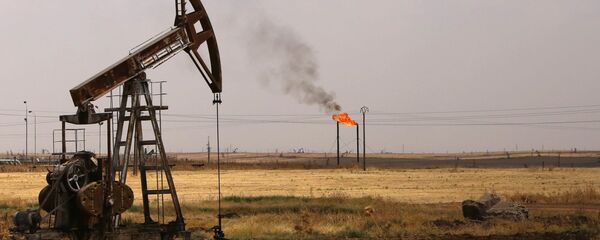MOSCOW (Sputnik), Alexander Mosesov — Earlier in the day, Russia's presidential spokesman Dmitry Peskov told reporters that Russia would use its data on oil deals between Turkey and Daesh in the fight against terrorism. This statement followed comments by Russian President Vladimir Putin on Monday that additional evidence had been received about the industrial scale of the oil exports from areas controlled by Daesh to Turkey.
TURKISH ROLE
"Oil has been sold via Turkey. Far more should have been done to pressure Turkey to tighten its borders, to prevent or stem the smuggling of oil and artifacts but also fighters and weapons," Chris Doyle, the director of the London-based advocacy group Council for Arab-British Understanding (Caabu), told Sputnik.
Doyle added that instead of dealing with the situation, Turkey, like nearly all external parties to this conflict, "has exacerbated matters."
However, Carole Nakhle, a scholar with the Middle East Center of the Carnegie think tank and a director of the UK-based advisory firm Crystol Energy, noted that "having some Turkish [buyers and traders] involved does not mean" the Turkish state itself is involved.
Nakhle did not exclude the existence of cases of corruption "especially when it comes to border controls."
Speaking of the volume of illegal oil being traded, the Crystol Energy director said no figures had been confirmed.
"After all it is a closed black market with unknown reliable figures about how much ISIS is producing daily, how much it is consuming and for how much it is selling the rest whether in the form of crude or refined products," Nakhle said.
OIL CONVOYS AND HUMANITARIAN CONCERNS
Moscow has been carrying out airstrikes against Daesh positions since late September. The group is outlawed in Russia where it is classified as a terrorist organization. A notable part of the Russian campaign was the decision to bomb convoys of oil trucks controlled by Daesh in an effort to strip the group of a main source of its income.
She also added that civilians have been warned recently to keep their distance from such trucks.
Chris Doyle noted that France joined Russia in bombing oil convoys, also adding that "there are concerns over hitting infrastructure and supplies that could have a humanitarian impact on civilians."
Doyle explained that much of Daesh oil sales go to other areas of Syria where they are dependent on oil income.
Various estimates put the income generated by Daesh through oil sales on the black market at about $1 billion a year. The share of this oil sold through Turkey is unknown.





